
Why take a permaculture workship?
Supported by strong ethics and principles, permaculture is a tool based on the observation of natural ecosystems (their efficiency, their productivity, their stability, their resilience, etc.) in order to deduce the principles which will allow the creation of autonomous systems. , durable and applicable to many areas: garden, farm, home, village …
During this permaculture course, participants will therefore learn in particular to sharpen their sense of observation in order to discover how to interrelate the elements present in the garden, and to work with nature and not against it. At the end of this initiation, participants will have acquired the basic principles of permaculture, as well as a first approach to the tools that allow its application.
In fact this type of agriculture is quite recent. Or rather its return to favor because we find traces of permaculture through the ages and continents.
This homecoming comes from two Australian biologist students who made observations and shared them in 1978 in a book called “Introduction to Permaculture” by Bill Mollison.
What better way than to paraphrase the author to conclude this little presentation:
“… The aim is to create environmentally sound and economically viable systems, which meet their own needs, neither exploit nor pollute and are therefore sustainable in the long term… Permaculture uses the inherent qualities of plants and animals, combined to the natural features of landscapes and structures, to create a vital system for town and country, using the smallest space possible. “
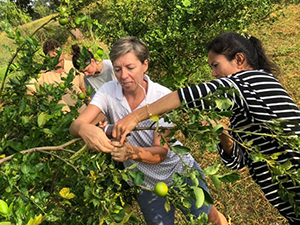

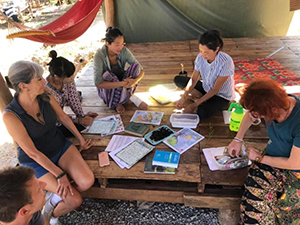
Permaculture internship: the program:
The ethics and principles of permaculture,
Models of nature,
Permaculture design
Cultivate, build, develop in permaculture,
The techniques
Urban permaculture,
The permacultural network,
The visit of the place,
Practical workshops in our organic farm
Soil: Understanding how it works, knowing that of your garden, making it productive and healthy
The plant: its biology and interactions with its environment
Plant health: mechanisms of action and natural care
Save water in the garden
Maintain fertility in a natural way
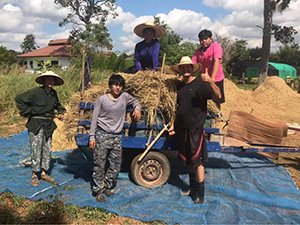
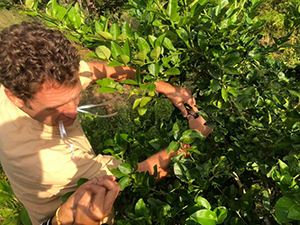

Price of our permaculture course
Before talking to you about prices, it is important to specify that these include the permaculture course but also accommodation as well as morning, noon and evening meals.
The price of the week (Monday to Friday), course, accommodation and meals:
10,000 THB per person in dormitory
12,000 THB per person in a private bungalow
20,000 THB for two people in a private bungalow
If there are more of you or if you want to combine this permaculture course with other activities, a natural construction course or woofing, contact me directly by email. Quick response guaranteed.
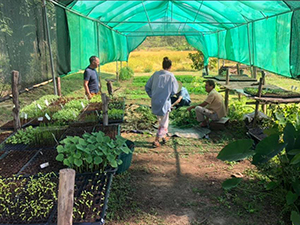
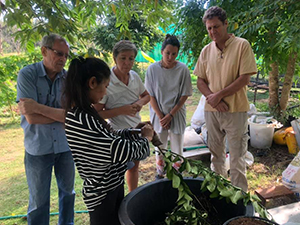
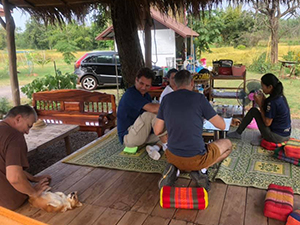
About Bill Mollison
Bruce Charles Mollison, known as Bill Mollison, born May 4, 1928 in Stanley, Tasmania and died September 24, 20161 in Hobart in the same state, is an Australian scientist committed to the environmental cause, who notably received the Alternative Nobel Prize2 and who is known to be the co-founder of permaculture.
Born in 1928 in Stanley (Tasmania), Bill Mollison left school at 15 and made a living from odd jobs. From 1954, he worked as a biologist for 9 years in the Australian bush for an environmental organization, then 3 years as a marine biologist for the Australian government. Then in 1966, he returned to school and still saw odd jobs, before earning his degree in biogeography and becoming a professor at the University of Tasmania where he created the Department of Environmental Psychology.
In 1974, Bill Mollison developed the concept of permaculture with David Holmgren. Since 1978, he has devoted all his time to the development of permaculture and in 1981, for his work on permaculture, he received the Alternative Nobel Prize.
The principles of permaculture according to Bill Mollison
From the ethics of permaculture, Bill Mollison developed this set of principles that allow a design to be considered:
Plan for energy efficiency
Relative location
Energy circulation
Border effect
Each element must have several functions
Each function is fulfilled by several elements
Work with nature rather than against it
Make the smallest effort for the biggest change
The problem is the solution
Since the stability, richness, resilience, and above all the efficiency of a system depends on the interconnections between its elements, if we encounter a problem at some point in the system, it is because a connection is missing. between certain elements. To solve it, we must therefore link the problematic element to another, even if it means introducing it, and the problem of one element becomes the solution of another.
Protection of biodiversity

One of the essential first steps for organic farming and self-sufficiency is to produce healthy and reproducible seeds!
Seeds are essential for humanity as they are the first step in the production of food. When they have been improved thanks to the intervention of the peasants, taking into account the particular local conditions, these seeds represent the cultural value of the traditions, knowledge and know-how on the use of biodiversity.
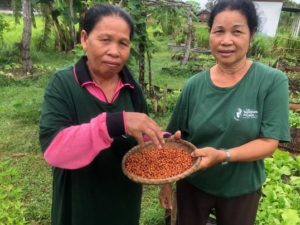
For our part, we of course work mainly with fertile organic seeds, thanks among other things to the partnership set up with the Kokopelli association… We produce winged peas seedsOur winged pea seeds for the Seeds Without Borders campaign, in return we receive vegetable seeds every year, we make a “fair trade”
What we also appreciate is receiving seeds from our visitors in order to increase the biodiversity of the farm. We appreciate it when our hosts bring seeds from their home country or from a country they have visited.
Sharing can also be done through what you bring… It’s a pleasure for us to have trees, flowers, vegetables from all over the world!
This exchange is of course a plus, and in no way an obligation.